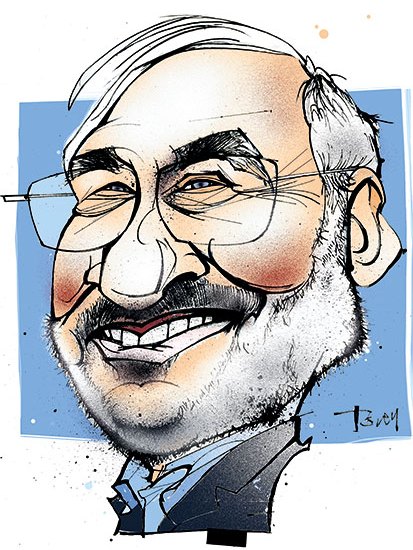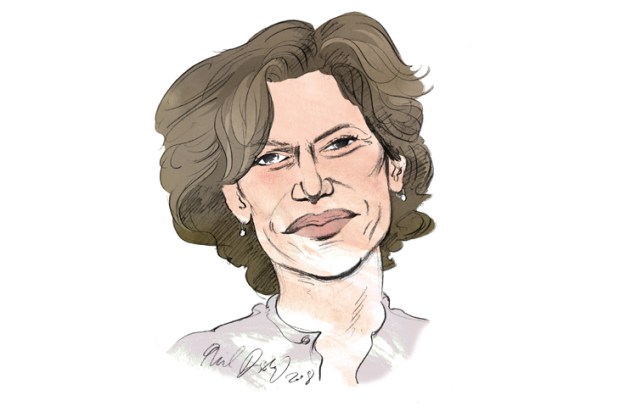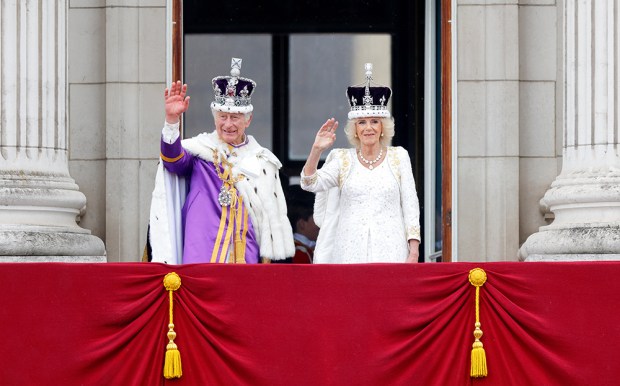‘How do you feel when you go back to Gary?’ I ask Joe Stiglitz. ‘Well, frankly, I get depressed,’ he replies. ‘The American middle class was created in places like my home town and is now struggling badly — which makes me sad.’
Stiglitz, a Nobel prize-winning economist and the closest thing the left has to an intellectual superstar, grew up in Gary, Indiana, during the 1950s, when it was the heart of the booming US steel industry. His father sold insurance and his mother was a teacher. ‘We had a modest detached brick house, with a lawn all around — it was safe and secure,’ he recalls. ‘Back then, if you worked hard and played by the rules in America, you’d make it — you could get ahead.’
Gary’s steel mills closed in the 1970s and thousands of skilled workers were laid off; the population has since halved, and Stiglitz says parts of his old neighbourhood ‘look like a war zone’. Countless cities have suffered the same fate, he says. ‘Gary is emblematic of the American Dream and that dream no longer exists.’
For Stiglitz, Gary’s demise isn’t so much due to globalisation — foreign competition for the US steel industry — as to the response in subsequent decades of Reaganite and Thatcherite ‘supply-siders’ preaching light intervention and low state spending. ‘There’s a large church in Gary that was once very beautiful but now lies ruined — in utter disrepair,’ he says. ‘It’s a symbol of what America does to its people and cities — you’ve worked for us, served us well and now you’re going in the garbage.’
Stiglitz’s career passed through Yale, Oxford and Princeton before a relatively smooth mid-1990s spell as chief economic adviser to Bill Clinton’s White House. But after joining the World Bank, he surprised many Ivy League colleagues by becoming, in his own words, ‘the rebel within’. He launched a fierce critique on the International Monetary Fund, his employer’s sister institution, for mishandling the late-1990s Asian financial crisis — condemning adjustment policies imposed on bailed-out nations as ‘brutal’. Eventually, he was sacked.
Since then, having been awarded the Nobel in 2001 for earlier academic work, he has written a string of hard-hitting books and commentaries on western economic policy. When the Occupy Wall Street protest movement emerged, its rallying cry — ‘We are the 99 per cent’ — was an explicit tribute to one of Stiglitz’s articles, a jeremiad about inequality and the US financial system titled ‘Of the 1 per cent, by the 1 per cent, for the 1 per cent’.
Stiglitz’s latest book, The Great Divide, is peppered with factoids about America’s growing inequality that the author recites on autopilot. The top 1 per cent commands a quarter of US income, he says, with one in five US schoolchildren now living in poverty. The average real wage of male non-graduates has dropped 12 per cent over the past 25 years, and American chief executives are now paid 300 times the average wage; it was 30 times in the early 1990s.
Unlike Thomas Piketty, whose recent bestseller Capital in the 21st Century argues that capitalism makes rising inequality inevitable, Stiglitz insists the system can be fixed. ‘Widening and deepening inequality isn’t driven by immutable economic laws,’ he says. ‘A well-functioning market economy doesn’t only create jobs, but should also generate increases in income that are shared.’
So Stiglitz is no anti-capitalist. He stresses that ‘getting markets to work like markets’ is the core message of his book. The problem ‘isn’t that we’ve been slaves to free markets, but that we’ve usurped them… Too-big-to-fail banks that extort government bailouts and big monopoly corporations that use their power to restrict competition are anathema to the free-market model — and are a lot of the reason inequality has risen so fast.’
In some senses, Stiglitz is a ‘big-state liberal’ in the Democratic tradition. When he argues that the US should have borrowed more after the 2008 collapse, I think he’s dead wrong. America has borrowed vast amounts. Since the crisis, its national debt has risen from $9,000 billion to $17,000 billion. The Stiglitz critique of inequality, though, is timely, as is his attack on the failure of western financial regulation.
Accepting that some inequality is ‘necessary to maintain economic incentives’, Stiglitz argues that wide income disparities eventually lead to a slowdown. ‘The US economy is in bad shape, with negative growth in the first quarter of this year and possibly the second quarter — so we may be in technical recession,’ he says.
‘One reason,’ he argues, ‘is that there’s so much inequality and people at the top spend a much lower share of their income than those at the bottom — so that kills aggregate demand.’ It’s a new twist on the traditional Keynesian case for government spending. ‘Inequality is both a symptom and a cause of a slowing economy.’
When I ask about the ‘extraordinary measures’ — $4,500 billion of quantitative easing — enacted by America’s Federal Reserve, Stiglitz steers the discussion to-wards Wall Street: ‘QE was necessary, if not on that massive scale, but the main point is that it was a massive bank bailout, a hidden subsidy of vast magnitude.’ It let insolvent banks across the western world to ‘get free money, then lend it back to their governments at 2 per cent or more — which clearly couldn’t have been done through an open and transparent political process’.
When it comes to criticising financial regulation, Stiglitz has form. In the mid-1990s, he watched powerless as Clinton’s Treasury Secretary Robert Rubin repealed the 1933 Glass-Steagall Act, which separated investment and commercial banking. Many observers, including Stiglitz, view this change — and the too-big-to-fail banks that resulted — as a central cause of the heightened market volatility that followed, including the 2008 crash. ‘We need Glass-Steagall, or something like it, but we need measures to tackle investment short-termism,’ he says. ‘But our financial lobbyists are so powerfulthat Glass-Steagall isn’t even on the table.’ Indeed, he says they’re trying to reverse Dodd-Frank, the much weaker set of regulatory measures imposed in 2010.
Since then, he says, ‘Unimaginable ghastly practices have been revealed, including the Libor scandal, which means we should actually be going beyond Dodd-Frank … the western banking sector, particularly in the US and UK, is giving capitalism a very bad name.’
I ask Stiglitz what kind of presidency we could expect under Hillary Clinton — someone he knows well. ‘I’m not yet sure which way Hillary will jump in terms of her closeness to Wall Street,’ he says. Maybe she’ll pick consumer-champion Elizabeth Warren as her running mate? He smiles.
Does Stiglitz himself want to return to the White House? ‘Maybe,’ he says. ‘But one of the great aspects of democracy is that influence can be exercised in many ways, and I may have more influence outside Washington.’
Got something to add? Join the discussion and comment below.
Get 10 issues for just $10
Subscribe to The Spectator Australia today for the next 10 magazine issues, plus full online access, for just $10.
Liam Halligan writes the ‘Economic Agenda’ column in the Sunday Telegraph.
You might disagree with half of it, but you’ll enjoy reading all of it. Try your first month for free, then just $2 a week for the remainder of your first year.















Comments
Don't miss out
Join the conversation with other Spectator Australia readers. Subscribe to leave a comment.
SUBSCRIBEAlready a subscriber? Log in